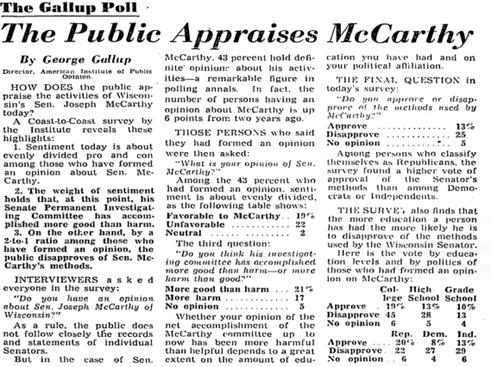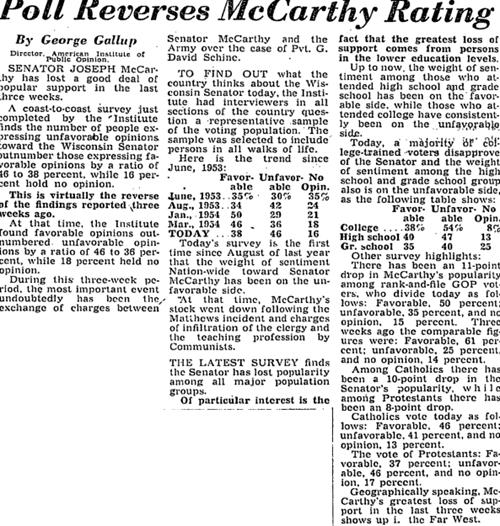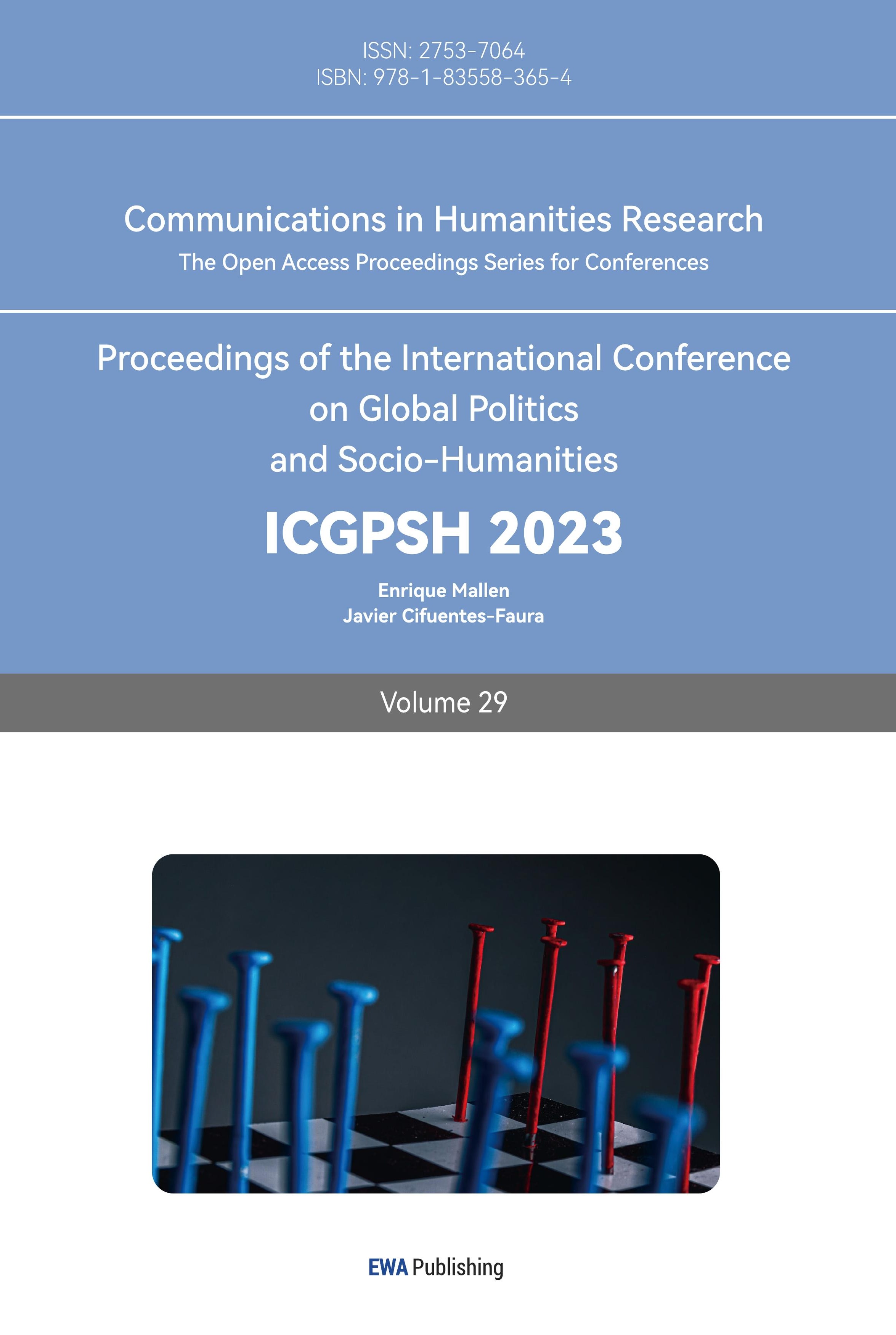1.Introduction
Joseph McCarthy is one of the most famous U.S. Senators of the 20th century. Like many Americans, he was vigorously anti-Communist, and was paranoid about Communist influence. His rise, then, is not surprising. But what is more surprising is his fall. Why, in 1954, did McCarthy fall from grace? The answer to this question tells us a great deal about Cold War America, including that of the human right. In this paper I’ll try to justify it is Joseph McCarthy’s big mistake in going after the American Military that lost him the support of both president Eisenhower and American people rather than the McCarthy hearing.
McCarthy dominated the US political climate in the early 1950s-a period that the fear of communism fueled following the Cold War tension through his sensational but unproven charges of communist subversion in high government circles, schools, broadcasts and so on. He obtained the chairmanship of the Committee on Government Operations of the Senate and of its permanent subcommittee on investigations from 1952. After that, his popularity soared, even reached the second most powerful man in Eisenhower government since 1953.
2.Secondary sources analyses
This topic is studied by multiple historians in the past explaining the reason why McCarthyism lost the support from the public sentiment, the historians Alia Hoyt and Schwarz respectively studied the subsequent reports and minute of the McCarthy hearing, thinking that it’s the McCarthy hearing that make American citizens know of the recklessness, bully tactics and impotence against challenge resulted in the downfall from prominence [1,2].At the same time, Historians Nathan Glazer, Anthony Lewis and Sam Tanenhaus also believed that the McCarthy’s poor performance in the hearing cause the doom of McCarthyism in public by citing words from Oshinsky, a commentator and Wisconsin newspapers.[3]
But both of them neglect a very important fact is that, before the hearing, the general sentiment has altered dramatically [4]. In other words, the hearing is the final step make McCarthy humiliated around the whole country, rather than the core reasons of it.
3.Primary sources analyses
To complete my research, I am going to compare the report commenting on the poll of the attitudes towards McCarthyism in 1953 (Figure 1) with that remarking the poll the attitudes towards McCarthyism in 1954 (Figure 2) to find out the variation of people’s opinion after McCarthy’s investigation to American army, which other historians studying the same topic don’t pay attention to.
The first sources the writer will focus on are two reports mentioned in the beginning of fifth paragraph. In this group of sources, it is clear to see that the ratio of unfavorable opinion toward McCarthy suffered great increase-from 30 percent to 42 percent after his charge to American army, even if it shortly plummeted in January 1954, the rate of people who showed negative attitudes once again surged since March 1954. Until the very day-around twenty days before the McCarthy hearing the poll was published, it had peaked 46 percentage. [5-6] In other words, the general sentiment started its dramatic change just after McCarthy’s attempts going after American army rather than after the hearing.

Figure 1: The first report issued on April 12th 1953 showed that the majority of American appraised McCarthy.
Source: “The public appraises McCarthy” , The Washington Post, April 12 1953

Figure 2: The second report issued on April 4th 1954 showed that the support rate of McCarthy suffered great drop in since the August, 1953
Source: “Poll Reserves McCarthy Rating”, The Washington Post and Time Herald, April 4,1954
And then look closely at the source, there are plenty of quotations that can support writer’s thesis statement, for instance, at the start of the report in 1954, the reporter pointedly showed that “McCarthy lost a great deal of popular support in the past three weeks, after his charge to American army” [6]. Additionally, at the paragraph that capitalized the phrase “latest survey”, the reporter clearly indicates that “the senator has lost popularity among all major population group, especially those persons from lower education levels following the Matthews incident and charges of infiltration of the clergy and the teaching profession by communists” .[6]
The second source we are going to pay attention to is a report by Joseph Alsop on June 17, 1953, headlining “Matter of Fact-McCarthy is beaten”. Though this incident fell before McCarthy’s investigation to the army in August, 1953, there is a point that has indirectly implied Eisenhower’s complete discredit to McCarthy after his attempt to investigate the army.
That point is at the beginning of the first paragraph, showing that “the Administration strategists are still seeking to preserve the meaningless façade of republican unity and allowed McCarthy to conceal his defeat behind a typical smoke-screen of misleading statement” .[7] From this sentence, it indicated that even if the president Eisenhower and McCarthy outbroke confrontation in the case of William Bundy, the core official of the CIA and “has found courage to meet a McCarthy challenge head on” at last [6], Eisenhower had no intention to abort the unity with McCarthy. That may because, according to the words from Ike, the president himself, Eisenhower hoped to use indirect approach to juggle the peace of his team and counterbalance of McCarthy and his allies all the time rather than battle with him right [8]. Therefore, the only possible reason that let Eisenhower give up his support to McCarthy is his action in charging with the American army- as it truly violated the redline of Eisenhower, who firmly believed that military is crucial in keeping the peace and property [9], to say nothing about his special relationship with the American army as well as the backup from military making him win the election. Just as what Ike mentioned, “I had no choice but to fight back.” [8]
4.Conclusion
In conclusion, it is McCarthy’s attempt to charge American army that disappointed American people and Eisenhower, as well as his final downfall. Honestly speaking, the whole process of the ouster of McCarthy as well as his McCarthyism is very ironic. That is because, the McCarthyism should become more popular when he was going after regular people, the group that really suffered great trauma and violation in human right. In contrast, this very cruel idealism was instantly abolished, coupled with the doom of McCarthy’s career, as soon as he tried to trespass Eisenhower’s redline-American army. Perhaps in the 21st century, the study or research about the reality of McCarthy’s downfall isn’t useful to the American development, from the writer’s perspective, it does matter in many other aspects: The first is in discovery of why some people claim that human rights is coming to a close, especially in the era that the popularity of anti-communism, nationalism and right-wing once again upsurged, while the last time those ridiculous idealism being the mainstream of American society is in the McCarthyism era. The second but the most important is in exploration of American government’s contribution to the human right advancement. Just as the writer mentioned before, the downfall of McCarthy was completely fulfilled by the will of Eisenhower, who felt threat because of McCarthy’s aggression and then made up his mind to take actions to sanction McCarthy. In a country that claimed democratic and equal since its foundation, Eisenhower’s authoritarian acts should have such great power in influencing the progress of American human right movement, which doubtless became a special phenomenon in the American government, that is worth being further studied to shed new lights on important figures of American government’s role for the development of American human right, ignoring by historians in a way.
References
[1]. Alia Hoyt, “How McCarthyism Worked”, howstuffworks (n.d), available here: http://history.howstuffworks.com/historical-figures/mccarthyism.htmSchwarz
[2]. Chwarz, Frederic D. “1954: The Demagogue’s Downfall.” American Heritage. Nov/Dec 2004, available here: https://www.americanheritage.com/content/1954-demaogues-downfall
[3]. Nathan Glazer, Anthony Lewis, Sam Tanenhaus, “Have You No Sense of Decency?” McCarthyism 50 Years Later, Bulletin of the American Academy of Arts and Sciences, Vol. 57, No.3(Sping, 2004) pp 22
[4]. Hudson.M. “Why did Joseph McCarthy’s influence decline?”, Encyclopedia Britannica, September 9, 2019, available here: https://www.britannica.com/story/why-did-joseph-mccarthys-influence-decline
[5]. George Gallup, “The public appraises McCarthy” The Washington Post (1923-1954), Apr 12, 1953, pg B5
[6]. George Gallup, “Poll Reserves McCarthy Rating”, The Washington Post and Time Herald (1954-1959), April 4,1954, pg B5
[7]. Joseph Alsop, “McCarthy Is Beaten”, The Wahington Post (1923-1954): July 17, 1953, pg 25
[8]. Miller Center, University of Virgina, “McCarthyism And The Red Scare”, available here: https://millercenter.org/the-presidency/educational-resources/age-of-eisenhower/mcarthyism-red-scare
[9]. Angry staff officer, “The Real Point Of Eisenhower’s Warning About The Military-Industrial Complex”, TASK&PURPOSE, January 15, 2016, available here: https://taskandpurpose.com/history/the-real-point-of-eisenhowers-warning-about-the-military-industrial-complex
Cite this article
Wang,J. (2024). What Is the Real Reason for the Ending of McCarthyism?. Communications in Humanities Research,29,162-165.
Data availability
The datasets used and/or analyzed during the current study will be available from the authors upon reasonable request.
Disclaimer/Publisher's Note
The statements, opinions and data contained in all publications are solely those of the individual author(s) and contributor(s) and not of EWA Publishing and/or the editor(s). EWA Publishing and/or the editor(s) disclaim responsibility for any injury to people or property resulting from any ideas, methods, instructions or products referred to in the content.
About volume
Volume title: Proceedings of the International Conference on Global Politics and Socio-Humanities
© 2024 by the author(s). Licensee EWA Publishing, Oxford, UK. This article is an open access article distributed under the terms and
conditions of the Creative Commons Attribution (CC BY) license. Authors who
publish this series agree to the following terms:
1. Authors retain copyright and grant the series right of first publication with the work simultaneously licensed under a Creative Commons
Attribution License that allows others to share the work with an acknowledgment of the work's authorship and initial publication in this
series.
2. Authors are able to enter into separate, additional contractual arrangements for the non-exclusive distribution of the series's published
version of the work (e.g., post it to an institutional repository or publish it in a book), with an acknowledgment of its initial
publication in this series.
3. Authors are permitted and encouraged to post their work online (e.g., in institutional repositories or on their website) prior to and
during the submission process, as it can lead to productive exchanges, as well as earlier and greater citation of published work (See
Open access policy for details).
References
[1]. Alia Hoyt, “How McCarthyism Worked”, howstuffworks (n.d), available here: http://history.howstuffworks.com/historical-figures/mccarthyism.htmSchwarz
[2]. Chwarz, Frederic D. “1954: The Demagogue’s Downfall.” American Heritage. Nov/Dec 2004, available here: https://www.americanheritage.com/content/1954-demaogues-downfall
[3]. Nathan Glazer, Anthony Lewis, Sam Tanenhaus, “Have You No Sense of Decency?” McCarthyism 50 Years Later, Bulletin of the American Academy of Arts and Sciences, Vol. 57, No.3(Sping, 2004) pp 22
[4]. Hudson.M. “Why did Joseph McCarthy’s influence decline?”, Encyclopedia Britannica, September 9, 2019, available here: https://www.britannica.com/story/why-did-joseph-mccarthys-influence-decline
[5]. George Gallup, “The public appraises McCarthy” The Washington Post (1923-1954), Apr 12, 1953, pg B5
[6]. George Gallup, “Poll Reserves McCarthy Rating”, The Washington Post and Time Herald (1954-1959), April 4,1954, pg B5
[7]. Joseph Alsop, “McCarthy Is Beaten”, The Wahington Post (1923-1954): July 17, 1953, pg 25
[8]. Miller Center, University of Virgina, “McCarthyism And The Red Scare”, available here: https://millercenter.org/the-presidency/educational-resources/age-of-eisenhower/mcarthyism-red-scare
[9]. Angry staff officer, “The Real Point Of Eisenhower’s Warning About The Military-Industrial Complex”, TASK&PURPOSE, January 15, 2016, available here: https://taskandpurpose.com/history/the-real-point-of-eisenhowers-warning-about-the-military-industrial-complex









